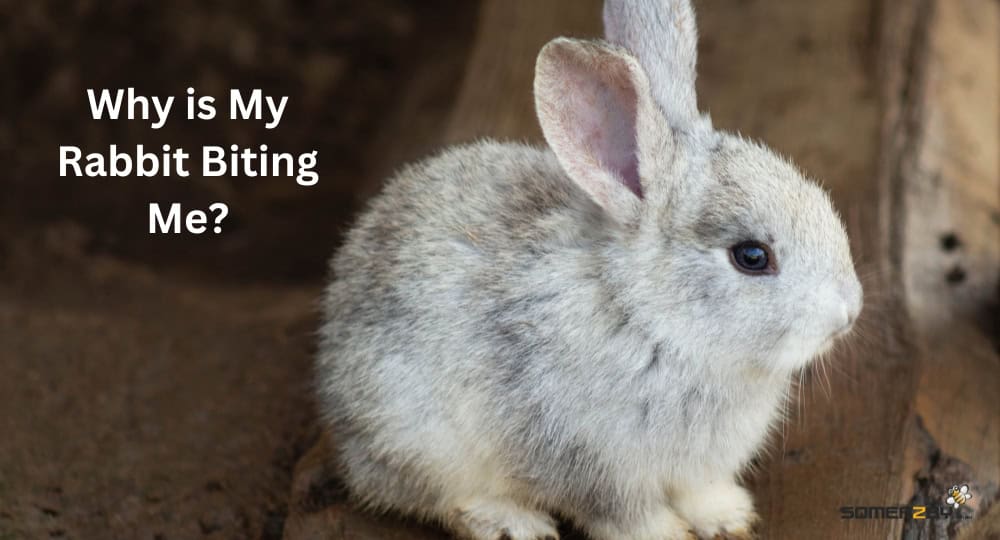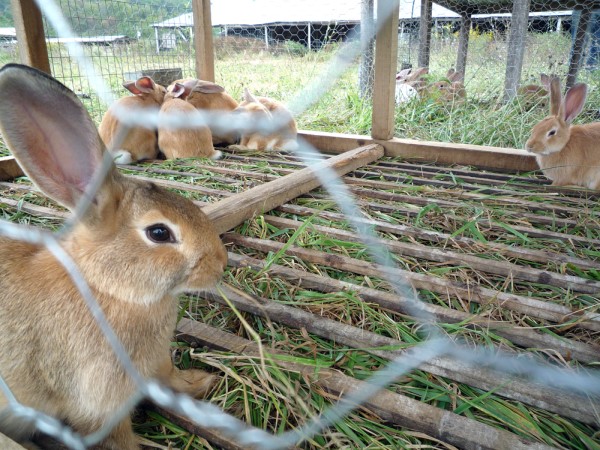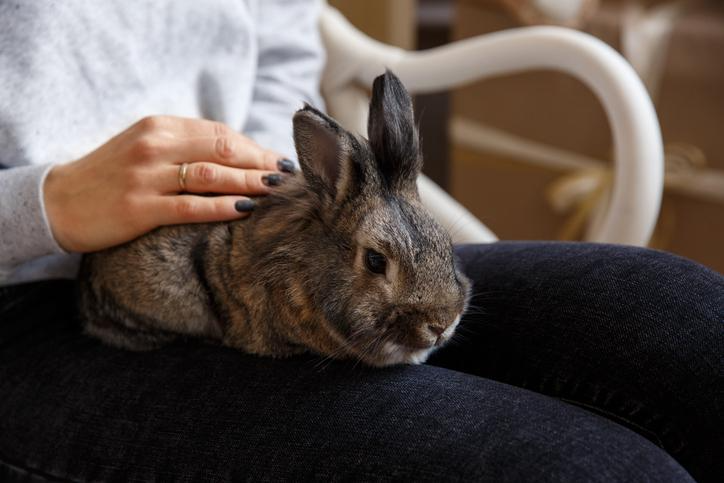Info Guides, Rabbits
Why is My Rabbit Biting Me?
When your rabbit bites you, it can leave you feeling hurt, both physically and emotionally.
You may feel confused and start to wonder – why is my rabbit biting me? If your bunny is biting you often, it will become less enjoyable to spend time together.
You may avoid your pet, for fear of being bitten. You may also worry this aggressive behavior means that you have an aggressive rabbit or that it doesn’t like you. But neither of these are true!
There are lots of reasons why rabbits bite. It is your responsibility to pay attention and address each bite properly. Work out why the biting happened and then how to stop biting from happening again.
This will keep both you and your bunny happy and help your relationship to be happier.
What To Do If Your Rabbit Bites You?
While rabbits look soft and gentle, they can bite surprisingly hard! In nature, wild rabbits have a herbivorous diet and need to be able to chew through a variety of tough things such as roots and branches.
This means wild rabbits naturally have quite a strong and powerful bite.
If a rabbit bites you, it is most likely to occur on your hands or feet. This is because these areas are most accessible to your rabbit. However, a rabbit could bite you anywhere.
Sometimes your rabbit may only nip you very lightly. This may leave a red mark or a small bruise. If this happens, you don’t need to action anything. However, if your rabbit has bitten you hard and drawn blood then you will need to give this proper attention.
The first step is to remain calm and secure your rabbit. If you were holding your rabbit when it bit you, gently place it back into its cage or another enclosed, safe area. You don’t want your rabbit running away or getting injured while you are off tending to your wound.
If you cannot safely move your rabbit without being bitten again, use a towel to pick the rabbit up. This will protect your hands from further injury. Avoid putting your hands anywhere near your rabbit’s head or teeth.
Now that your rabbit is secure, you will need to clean your wound. Wash the wound gently with clean water. To avoid infection, apply a thin layer of disinfectant or antibiotic cream. If your wound is bleeding, apply a band aid.
Over the next few days, keep your wound clean and check it regularly. If it shows signs of infection, see a doctor. You will need to follow these same steps if you are bitten by a guinea pig.
Reasons Rabbits Bite
When your rabbit first bites you, you may take it personally and worry your rabbit hates you. But that isn’t true! There are lots of different reasons rabbits bite.
Rabbits are not naturally aggressive. If your rabbit has bitten you, it is trying to communicate something to you. You may feel like your rabbit is biting you for no apparent reason but this only means you haven’t yet worked out what the reason behind this behavior is.
Listening to your rabbit’s message and working out the real reason behind the biting incident is the first step in working out how to help your rabbit feel secure and prevent it from happening again. You don’t want biting to become a regular occurrence.
If your rabbit is regularly biting you, this will naturally make you want to avoid handling or spending time with it. This can break down your relationship and making owning bunnies a less enjoyable experience.
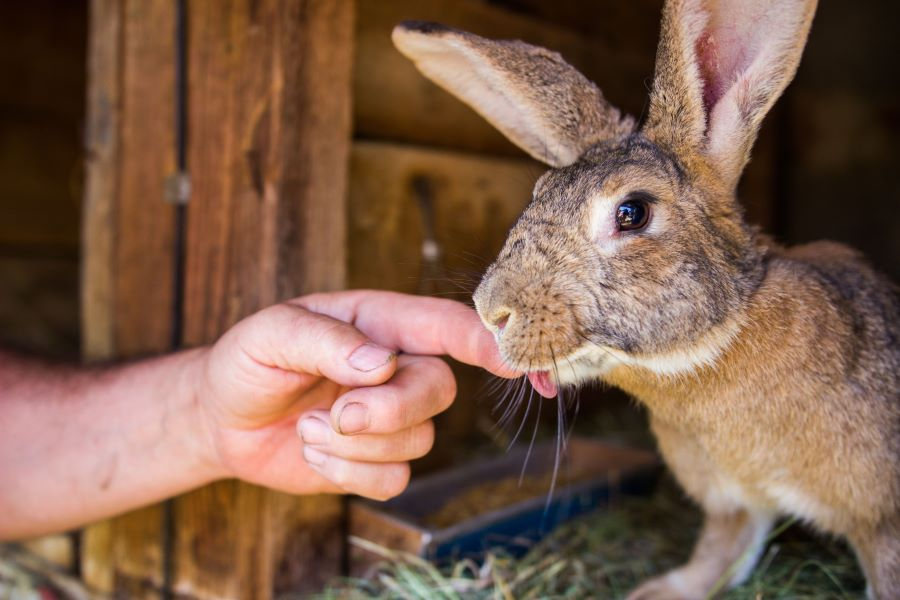
Reasons rabbits bite
Regular biting also means your rabbit is unhappy in some way.
It is your responsibility, as a pet owner, to make sure your pets are safe, comfortable and happy. Discovering the reasons why your rabbit is biting will reveal changes you need to make in your bunny’s life or changes you need to make in the way you interact with or approach your rabbit.
Domestic rabbits will bite as hard as they need to. Sometimes your rabbit will just give you a little gentle nip.
This can sometimes be your rabbit showing affectionate or trying to groom you. A nip may also be a gentle, first warning when your rabbit is trying to tell you something.
However, sometimes a bite will be much harder and really hurt you. Reasons a rabbit bites include:
Prey Animals Feeling Threatened
A common reason pet rabbits bite is fear. If rabbits feel threatened or scared, they may bite as a form of self defense. Wild rabbits are naturally prey animals. When it comes to their instinctive fight or flight response, rabbits prefer to run away.
However, if they are cornered or unable to flee then their last resort is to try attack. A rabbit’s teeth are one of their only physical ways to protect themselves.
Other signs your rabbit is becoming defensive including lunging, tooth grinding, making a grunting noise or opening its mouth wide.
Animals are more likely to use biting as a form of defense if they have an abusive past. They may be traumatised and believe the same thing will happen again to them.
Acting Territorial
Another reason rabbits bite is to protect something they own. They may bite if they become worried you (or other bunnies) are about to take something away from them.
This could be anything within your rabbit’s territory including their cage, food bowl, litter box, water bottle or chew toys. Female rabbits will be very protective of their babies. If you try to pat or pick up one of their kits, they may bite you as an attempt to protect their young.
Pregnant female rabbits may suddenly become territorial of their cage or food, even if they never have been like this before. This behaviour is their instincts kicking in and preparing them for when their babies arrive.
Boredom
Rabbits are intelligent animals and require mental stimulation. If they become too bored, they may bite as a way to keep themselves feeling busy.
If your bunny is bored, any bites will most likely just be a gentle little nip. This is their way of saying, “Hey, don’t forget about me!” or “Play with me!”
Bored bunnies will also bite or chew on other things. If your usually calm rabbit is suddenly chewing on the sides of its cage excessively, this can be a sign of boredom.
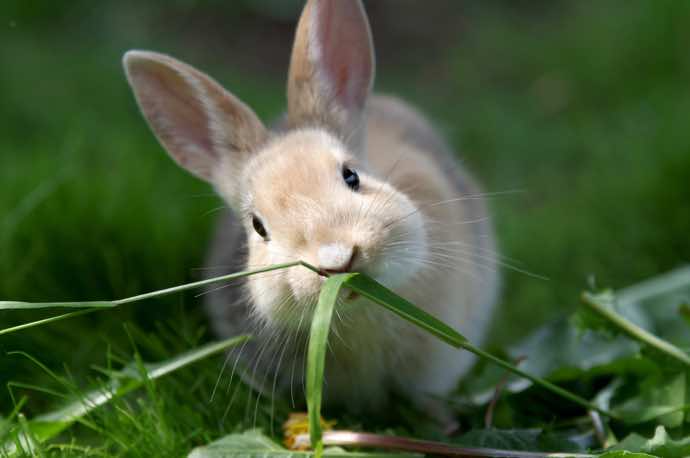
Bored Rabbits
If your usually calm rabbit is suddenly chewing on the sides of its cage excessively, this can be a sign of boredom.
Establishing Dominance
A rabbit may bite as a way to establish dominance.Some rabbits are naturally dominant and want to assert themselves as leader.
A dominant rabbit may bite you or it may bite other rabbits. The bite may not necessarily be very hard. Dominant rabbits don’t bite to injure you but to prove a point and show you that they are in charge.
This aggressive behavior is more commonly seen in wild rabbits or in domestic male rabbits. If you have two male rabbits as pets, they may fight as a way of deciding who is the boss.
It is therefore recommended you only keep one male per enclosure, to avoid this behavior and related injuries. However, don’t be fooled! It is not only male rabbits that do this. Female rabbits can also bite to assert dominance.
This bad behavior typically begins to show itself once a rabbit has reached sexual maturity, at around 4 months of age. This is when its raging hormones kick in and start to take over. This aggressive behavior may continue throughout your pet rabbit’s life if it is not desexed.
Pain
If your rabbit has never bitten you before but is suddenly biting, it could be an indicator that your rabbit is in pain or is feeling unwell. Biting used as a behavior to express pain is also common in other pets and wild animals.
How to Stop a Pet Rabbit Biting
Now that you’ve worked out why your rabbit is biting you, your next question is – how do I stop the biting? Well, the reason your rabbit bit you is the key to working out how to prevent it from happening again.
Prey Animals Feeling Threatened
Has your rabbit started biting you because it feels scared or threatened by you? Rabbits are naturally timid and easily frightened.
You will need to work out what behaviour you are doing that is scaring your rabbit. Then, do your best to stop that behaviour. Loud noises are a common reason rabbits get scared. Remember that rabbits are tiny animals. A noise that seems normal to you may seem very loud and scary to them.
Loud noises include banging the door of their cage, stamping your feet, dropping their food bowl on the ground, or yelling or talking loudly.
If your rabbit begins to associate you with a loud noise, it could become scared of you in general. So approach your rabbit in a calm way and avoid making loud noises if you can.
If your rabbit doesn’t realise you are there and then you suddenly appear or touch your rabbit, it may panic and bite you.
Try not to startle your bunny
Another reason rabbits feel threatened is if they are startled. Rabbits hate surprises!
Avoid this by making sure your rabbit knows you are nearby for a few seconds before you get close enough to touch it.
You can do this by gently talking to it and saying its name when you are still far away. Once you have your rabbit’s attention and it turns to look at you and acknowledge your presence, then slowly approach it.
A rabbit may also feel threatened and start biting if it feels trapped. If you corner your rabbit in its cage, it may panic and feel like it can’t get away. It could then bite as a form of self defense. This can make picking your rabbit up very difficult.
In an ideal world, you can prevent this by letting your bunny approach you to be picked up, rather than you cornering it or chasing it around the cage.
However, if you need to pick it up urgently but it won’t come to you, this isn’t always possible. We recommend approaching your rabbit slowly and calmly. Bend down to its level so you aren’t towering over it. Reach out with your fingers spread out and using predictable movements.
The more time you spend with your bunny, the more you will bond and the less it will see you as a threat. Spending time together will let your rabbit get to know you and feel comfortable with you. Hand feeding your rabbit food can also help you to bond.
Acting Territorial
If you have determined your rabbit bites because it is defending its territory or food, you may need to change the way you interact with it.
If your rabbit bites when you enter its cage, this can make cleaning it out tricky. The easiest solution is to gently remove your rabbit from its cage when cleaning it out. Put it into a secure, temporary enclosure until you are done.
If your bunny is showing signs of food aggression and becoming territorial over its food bowl or water bottle, regularly move these around the cage so they aren’t always in the same place.
This can minimise food aggression by preventing the rabbit from thinking this location is controlled by him.
Food aggression is reported to be more common in domestic rabbits compared to wild rabbits, particularly if they feel their food supply is too limited. These rabbits may worry food will run out and therefore get very defensive of the food they do have.
Prevent this by making sure your pet domestic rabbits have constant access to hay and fresh water. Feed them other food such as pellets and treats at different times each day.
If your female rabbits are biting because they are pregnant or trying to protect their baby kits, this is harder to stop.
It is recommended you leave the doe and kits alone as much as possible. If you need to pick one of them up and it cannot be avoided, pick them up gently using a towel or some sort of hand covering to protect you from being bitten or injured.
Avoid the rabbit’s head and teeth as much as possible.
Boredom
If your bunny has started biting or developing behavioral problems due to boredom, you will need to provide your rabbit with more mental stimulation.
Add toys into the cage. Toys from a pet store can be quite expensive but you can make toys at home quite easily and for very cheap. Cut out holes in cereal boxes or other old cardboard cartons to create a tunnel.
You can also stuff food (such as hay or veggies) onto a toilet roll. This makes it an exciting challenge for your rabbit to get the food out. Hiding food treats throughout the rabbit’s cage is another fun way to keep it busy. It will have to hop around trying to find the food!
Another simple boredom buster is taking your rabbit out of its hutch once per day for exercise and play time. Even 15 minutes of time outside of its hutch hopping around can make a huge difference to your bunny’s behavior.
We recommend blocking off a safe area where your bunny cannot escape or come into contact with any hazards. You could set up a playpen in your backyard or somewhere inside your house.
Establishing Dominance
Once they reach sexual maturity, rabbits may begin to show dominance by biting either you or each other.
The easiest way to stop this is to have your pet rabbit desexed. This will alter its hormones and usually limit any wild, dominant behavior. Before the operation, discuss your concerns with your veterinarian to help decide if this is the right course of action for your beloved bunny.
Pain
If you suspect your rabbits are biting you to express that they are in pain, take them to your local veterinarian for a check up as soon as possible. They will examine your rabbits and run tests to rule out any illnesses.
Training
Rabbits are intelligent and can be trained not to bite you.
However, remember that they are a rabbit and won’t learn as easily as a dog. Training rabbits not to bite may take you a long time. You will need to be very patient and consistent. Rabbits may also forget what they learned and have to be re-trained regularly.
Tips for Training Rabbits
Use Positive Reinforcement
Always train your rabbit using positive reinforcement. Basically, if your rabbit shows good behavior then give it a reward. Possible rewards include a pat or food treats. Limit treats to a couple per day as excess can lead to obesity and related health issues that could shorten your rabbits life.
Never use negative reinforcement to punish your rabbit. A rabbit bite hurts and may tempt you into yelling at your rabbit. Resist! Your rabbit is unlikely to draw a correlation between you yelling and the bad behavior, so it is unlikely to actually learn anything.
Yelling will scare your rabbit and may make it more defensive. This can lead to even more biting and worsen your problem.
Squeal In Pain
When rabbits are in pain, they naturally let out a high pitched squeal. If you have ever heard your rabbit make this sound, you know that it is heartbreaking. If your rabbits nip you, let out a very high pitched noise that mimics this sound. This is a way of communicating to your rabbit that it hurt you.
Avoid yelling loudly or screaming ‘ouch!’ as the rabbit may not recognise that this deeper sound indicates pain. Ideally, this will help your rabbit to realise it is hurting you. Next time it may bite softer or it will hopefully stop biting all together.




